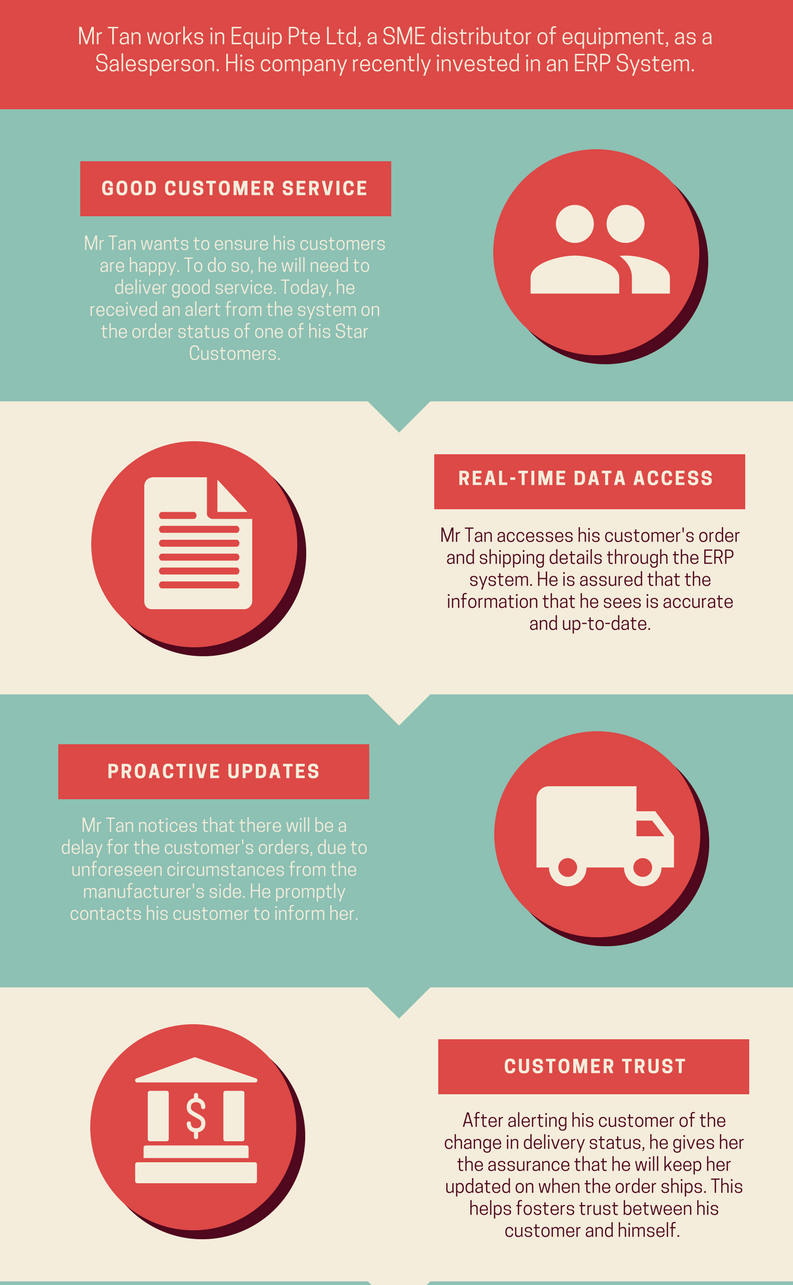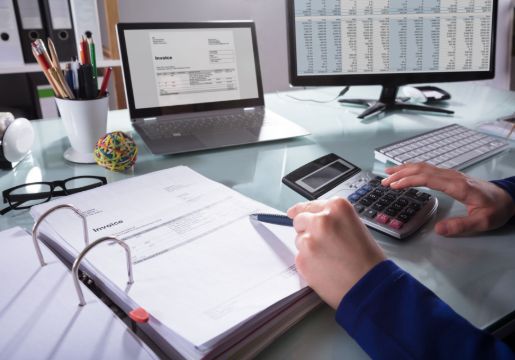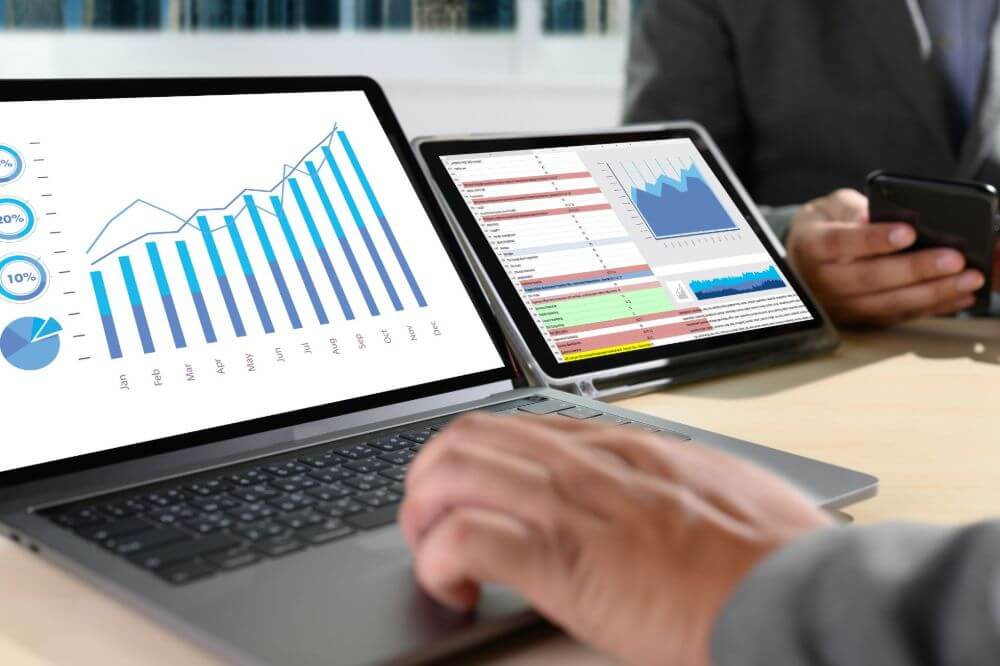As an ERP solutions provider, we often get enquiries from SMEs asking for an ‘upgraded’ accounting software. Upon probing further, we learn that what they’re really looking for is an ERP system.
This common misconception stems from the idea that ERP software, or enterprise resource planning software, is just another fancy name for accounting software (hint: it’s not).
While ERP systems share a few similar characteristics with most modern accounting systems, the two differ significantly in form, functionalities, and security.
To put it simply, accounting software’s capabilities are a fraction of what you can find in full-blown ERP software, and below’s a summary of the differences between the two:
What Is An Accounting Software
A familiar sight to many SMEs, accounting systems play a key role in facilitating and monitoring a company’s lifeblood – financial transactions.
You’ll find modules like general ledger, journal entries, accounts payable and receivable, billings, fixed assets etc. in typical accounting software. From there, you can generate basic enterprise financial reports such as profit and loss statements, and income statements.
By recording and integrating the financial aspects of an SME’s transactions, accounting software gives users a snapshot of the company’s financial health at any time.
Good accounting software also ensures efficient, accurate financial and cost accounting in an SME. Integrating financial and cost accounting into a single system lets users perform financial recording within one set of accounts, making it easier to access the right information quickly.
In comparison, doing this across multiple Excel spreadsheets risks inaccurate data entries and higher labour inefficiencies.
Where accounting software falls short is its inability to easily anticipate tomorrow’s demands. This requires a truly integrated system that allows for seamless transactions and information across the organisation, and this is where enterprise resource planning (ERP) systems shine.
What is in an ERP System
The difference between using accounting software versus an ERP system is significant, as ERP software goes far beyond what accounting software can offer. While an accounting system covers everything an SME needs for accurate and efficient financials, an ERP system covers a wider range of functionalities, such as:
- Financials and Reporting
- Order Entry and Purchasing
- Inventory Control and Warehouse Management
- Kitting and Assembly, and Serial and Lot Control
- Light Customer Relationship Management (CRM) and more
A good ERP system should also easily integrate with other solutions like Point-of-Sales, e-Commerce, barcode or RFID scanners and so forth. More importantly, a good ERP system is designed to be scalable, so it can grow alongside your business.
What Are the Benefits of Using ERP Software?
This brings us to the value of having an ERP system in place. An ERP system draws data and transactions from various business processes into centralised data warehouses.
With this, users get a comprehensive, 360-degree enterprise-wide view across all sites. This allows them to easily analyse and manage day-to-day business operations – finance, inventory planning, budgeting, supply chain and more.
Subsequently, this enhanced visibility helps SMEs improve the timing of their sales, reduce stock wastage, detect deficiencies, and identify new opportunities to grow strategically.
Having a centralised database also facilitates accurate, real-time information across departments. This enables managers to make strategic, data-driven decisions, and employees to react proactively to day-to-day issues on the ground.
Let’s take a fictitious Mr Tan below as an example:

As such, we can see that accounting systems are not scaled-down ERP systems, nor are ERP systems ‘upgraded’ accounting systems. Instead, picture accounting software’s functionalities as a subset of what ERP software can provide to an organisation.
What are the Differences Between Accounting Software and ERP?
To better illustrate the differences between accounting software and ERP, here are some areas where they diverge:
An ERP solution offers a level of insight and functionality that surpasses what traditional accounting software can provide. Unlike accounting software, which focuses primarily on financial transactions and bookkeeping, ERP systems encompass a wide range of modules, allowing them to help users with a broader spectrum of operations.
By integrating data from various departments and processes into a unified system, an ERP system also offers users a consolidated overview that helps them understand a business’s performance more thoroughly. As a result, ERP systems facilitate better decision-making and strategic planning.
Should I Get An Accounting or ERP System?
Nonetheless, there are real and functional differences between accounting and ERP solutions. To directly compare accounting software against ERP software wouldn’t make sense; it’d be like comparing apples to oranges and asking which is better.
So here’s an alternative: Rather than asking yourself, ‘Should we get ERP software or another accounting software’, a better approach is to ask yourself when.
When should we get an ERP software?
When is the right time to move on from our current accounting system?
As mentioned above, accounting and ERP systems incorporate multiple functionalities into a single system. Like its namesake, accounting software focuses on accounting-related functions, while ERP systems are scalable systems with functionalities that span across the organisation.
For most small businesses and start-ups, a modern integrated accounting system is enough for their needs. But once they start growing, these businesses realise they lack the ability to manage their processes across all departments effectively. Also, from a data perspective, they find they lack a single version of the truth.
So here’s are three questions to help you assess whether it’s a good time to invest in an ERP software for your SME:
1. Are You Using Different Systems to Manage Different Processes?
If you’re using multiple systems to run different departments, you will run into productivity, efficiency, and coordination issues.
Suppose your sales data isn’t updated or keyed in correctly. This affects your production and inventory management departments, which in turn spirals on to affect other departments. Even if you did have a good accounting system in place, the lack of integration across your SME could result in a difference in understanding between teams. This means you’ll be hard-pressed to prevent this costly rippling effect.
What ERP software excels at is integrating these disparate systems together, so your business functions rely on a single database. With one source of information that contains accurate, real-time data, an ERP solution breaks up information jams, helps employees make faster, smarter decisions, and frees managers to focus on high-value activities like identifying new business opportunities.
2. Are Your Accounting Processes Slow and Tedious?
You have an accounting software in place. It even served you well in the early days of your business.
But of late, you notice a significant difference: things aren’t proceeding as smoothly as they used to. It takes forever for your finance team to generate reports. And when pressed, they tell you it’s because they need more time to consolidate and reconcile the information spread between systems and multiple spreadsheets. They also expect you to be more understanding because they waste hours manually keying in data from paper invoices and sales orders into the accounting system.

Because everyone enjoys working late into the night, right?
By moving onto an ERP system, you get all your business process data within a single database. Routine tasks can be automated, freeing your finance team from rekeying or reconciling data manually. As a result, your teams are more productive and able to generate the reports you need with minimal delays.
3. Does it Take a Long Time to Get the Information You Need?
Quick question: how long does it take to find out whether your sales figures are up to date? Can you quickly get accounting information like your average sales margin or average order per day?
If your answers to the above are ‘forever’ and ‘no’, it’s time to relook at your enterprise’s approach and systems. Among SMEs, the pace and pressure to succeed is greater than ever. Your executives want a holistic view of their business whenever they need it, while your other employees will expect to get accurate information so they can do their work faster.
For this to happen, your executives and staff will need quick and pain-free access to accurate, real-time data. If your SME is still manually reconciling spreadsheets and siloed systems, it’s almost impossible to get that speed of access quickly.
What is an ERP System in Accounting?
Perhaps the most notable advantage of ERP systems is their ability to cover a wide range of functions that surpass the capabilities of conventional accounting software:
- Data consolidation: With the ability to integrate data into a unified system, ERP removes cases of data duplication and inconsistencies. Through this, data accuracy is enhanced, allowing for more precise analytics and better decision-making that improves operational efficiency and overall business effectiveness.
- Compliance: By offering a consolidated data platform, ERP also significantly reduces the time required for paperwork processing involved in ensuring regulatory compliance, enabling cost savings to be achieved. Additionally, ERP software often comes with built-in features that empower businesses to stay up to date with evolving regulatory frameworks to ensure adherence to legal obligations.
Supply chain management: A significant advantage offered by ERP systems is their ability to enhance supply chain management. For instance, many ERP systems can monitor the journey of finished products and raw materials from production to delivery. This comprehensive tracking process enables organisations to gain insights into potential issues such as delays and stock outages, facilitating proactive measures to address them. By having visibility and foresight into the supply chain, ERP systems empower businesses to eliminate inefficiencies and take timely actions, ensuring smooth operations with minimised disruptions. This powerful feature goes beyond the functionalities of accounting software, which is focused on financial transactions and bookkeeping.
Is It Time to Change?
In short, ERP systems are often confused with accounting software packages, but they’re different. Accounting software packages offer a fraction of what true ERP software can offer and are ideal for SMEs or start-ups just getting into the business.
Growing SMEs still relying on accounting software might find the software’s functionalities insufficient to meet their goals – moving to ERP software will be the next natural step. To learn more or get some advice, you can drop us a note here, and one of our advisors will get back to you shortly.
Still unsure if there’s a need to look at ERP software? Check out AFON’s free download below, which highlights real problems real companies face – and how they used ERP systems to make improvements.





